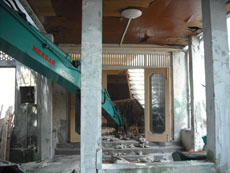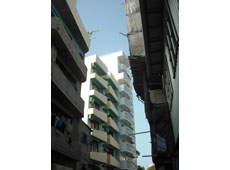The government has proposed an amendment to the Tourism Act that reduces the rent resorts pay as well as extending the lease period to fifty years, a move which would significantly reduce the government’s income from the tourism industry in the short term.
The bill was proposed by MDP MP Ibrahim Mohamed Solih, who said the main aim of the bill “is to improve investor confidence and performance of the tourism sector.”
Solih said rent would be charged depending on the resort’s area and not number of beds. Resorts are now to pay US$7 for each square metre.
Resorts would also be categorised according to their size; the smallest group being from 100,000-200,000 m²; the second from 200.000-400,000 m², and the largest is above 400,000 m².
Solih said this will ease the burden on resort owners and will help resorts currently under construction around the country.
He noted that this would reduce the government’s income from the tourism sector from Rf 1900 million (US$148 million) to about Rf 1300 million (US$101 million).
Creating an investor-friendly environment
Minister of Tourism, Arts and Culture, Dr Ali Sawad, said the amendments to the Tourism Act will create more macro-economic opportunities in the Maldives.
“It is geared towards achieving three objectives: the first is transforming leases to land rent. The second is phasing out the bed tax, and the third is increasing the lease from a minimum of 35 years to a minimum of 50 years.”
Resorts currently pay a flat rate of US$8 per occupied room, per night, known as the ‘bed tax’, however the resort industry has criticised this as a disincentive to increase capacity and promote expansion, and limited potential revenues in the future.
Dr Sawad said since all the revenue streams are linked, any amendments to the bill will have a “ripple effect on the economy” and would create an environment for greater investments as investment costs are decreased.
He assured that the amendments would bring in more revenue starting from next year, but admitted the government would see “a slight drop [of revenue] during the transition. It’s all part of a larger fiscal policy.”
The amendments to the bill would ultimately “not lower revenue” from the tourism industry, as they were intended to make investment in the Maldives “more attractive.”
Former Minister of Tourism Abdulla Mausoom said “we definitely have to create a positive investment environment in the country,” because in the last year and a half, “investor confidence has been down.”
He said the outcome of both the tourism bill and the taxation bill “are not certain.”
“The Maldives is very small and our natural resources are limited,” Mausoon said. “The government has a responsibility to look after our resources.”
He said he believed “it is not in the best interest of the country” when an investor is willing to pay a better price and the government had set a lower fixed price.
“We should facilitate and investor-friendly environment without eliminating the competitiveness of the market,” he said.
Mausoon suggested the government set a minimum fixed rate and have bidders propose higher bids from there. He said most of islands desired by resorts were what he termed, “micro-islands” or those less than 10 hectares in size (less than 0.1 km²).
“The government has a responsibility to safeguard our assets,” Mausoon said, noting that if investors are willing to pay more, “they should be allowed to pay more.”
‘Sim’ Mohamed Ibrahim from the Maldives Association of Tourism Industry (MATI) said “we think this a very forward-thinking bill. Obviously there are little tweaks needed, but overall it’s a good bill that has come at the right time.”
Sim said “the government has worked closely with the tourism industry to develop this bill” and had consulted with the industry “at every stage.”
Bed tax and island lease vs. GST and land rent
Currently, the cost a resort pays the government is based on the number of beds it has. Dr Sawad said on average, the government was making anywhere from US$3,500-20,000 per bed every year, generating a total of US$47 million in revenue from the bed tax per year.
He said a “conservative estimate” of how much revenue the government’s proposed Goods and Services Tax (GST) is expected to bring in was over US$60 million a year. He noted that the tax revenue would continue to increase as the tax net widens.
Dr Sawad said the bed tax would be phased out in the next three years when the GST is in place.
He also said the leases for resorts currently brought in around US$78 million, while the land rent should collect about US$60 million a year.
“By addressing the lease rent head on, we will be able to reduce investment costs, which makes for a more attractive investment,” he said.
However Mausoom said the land rent increases the uncertainty for the tourism industry, because there is no guarantee as to how many beds will be developed on then land: “A resort owner can build as many rooms as possible.”
“This US$7 per square metre is very misleading,” he added, noting that “the government will only be getting three set rents: US$1 million [per month] for the islands in the smallest bracket. For the middle bracket it will be US$1.5 million, and US$2 million for the larger islands. It doesn’t make sense.”
He pointed out the smallest bracket—those islands smaller than 200,000 m²—“should catch at least US$1.4 million, if you multiply it by US$7 per square metre. It’s totally misleading.”
Another thing he believes is unfair is the government’s decision to wait until the GST is in place before ratifying the Tourism Act. “They can’t put a condition like that,” he said, “it’s putting an extra burden on resort owners.”
Mausoom also said he believed there were “many discrepancies” in how the MDP is trying to consolidate the different bills and acts concerning fiscal policy, and said “the government has to start singing the same song. A song that is nice to the Maldivian people, nice to the investors, and nice to the tourists.
Sim explained that the amount the government will lose in land rent (compared to the current lease and bed tax scheme) would be offset by the GST levy, “which would go hand-in-hand with this bill.”
He said adding the business profit tax, GST and land rent, the resorts will “probably pay more than they do currently alongside existing government revenues from customs duties.”
He added that the three year waiting period to phase out the bed tax “is a bit long and [we] will try to lobby for one year.”
Sim also noted that the major issue with the Maldives’ tourism industry is capacity: “The industry can only grow through an increase in capacity. The current situation is good for people who have established, successful properties, [but not for new investors].”
The new system, he said, would offer businesses “certainties” and reduce the current level of “maneuvering” occurring within the industry.
Likes (2)Dislikes
(2)Dislikes (0)
(0) 
